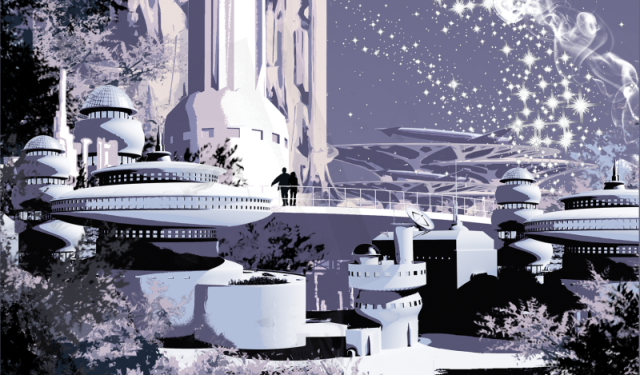 |
Hi Mom,
Usually, I do not review a book until I finish it. And lately, I have stacks and stacks of books that I have not reviewed. It's a time investment thing. It's due to my struggles to consistently produce original content.
However, with this book, due to the narration, I felt compelled to post a review of the audio book even before completing it.
Amusingly, I have only posted two other reviews to Audible, both due to terrible narrator.
I love the cover art. The book is interesting. It deserves awards. For me, there's something missing, but I am not sure what, and I cannot be certain that what I am missing is not due to the terrible narrator.
I will add to what I wrote below that the narrator improves when he reproduces dialogue. It's the narrative and exposition in which his pitch and cadences are extremely annoying and almost impossible to listen to.
Though I did not review, I also really disliked the narrator for Wizard's First Rule, and I will never be certain if the book is bad or the narrator ruined it for me. Though I am leaning toward the story and the novel, despite its popularity, being terrible. One of Stephen King's narrator's, notably the one who did The Talsiman, was particularly awful.
When listening to a book, the narrator makes or breaks the thing. Much like a comic book. Great writing cannot save terrible art. But fantastic art can save poor to mediocre writing. The same concept holds true for narration: great narration can elevate a mediocre novel, but poor narration will ruin a listening experience, even when the novel is good or great.
I may have re-read this book at some point the old fashioned way, with eyes on the page.
Review posted to AUDIBLE today, 1801.13:
Lavie Tidhar’s novel Central Station is well lauded and applauded in SF circles: shortlist for the Arthur C. Clarke Award, was a finalist for the Locus Awards, and only two weeks ago has been awarded the John W. Campbell Memorial Award for best science fiction of the year.
Though there is some legitimacy in the book reading like a series of vignettes due to parts being previously published, the whole does hang together. Readers will come for the inventive world-building and the multi-cultural perspectives. Not many modern SF novels buzz like the eponymous interplanetary hub of the novel's title located between Jewish Tel Aviv and Arab Jaffa.
One element that's especially fascinating is the "Conversation": "Billions of humans, uncounted billions of digitals and machines, all talking, chattering, sharing at once. Images, text, voice, recordings, all-immersive memcordist media, gamesworlds spill-over—it came on her at once, and she reeled against it.”
I recommend this novel to anyone who enjoys science fiction. The data vampire (Strigoi), the damaged cyborg soldier (Robotnik), and the powerful aliens (the Others) create a rich and engaging tapestry of SF quite unlike anything out there right now.
When I see praise from one of my favorite writers, Warren Ellis, it gives me pause: "It's all of science fiction distilled into a single book." ―Warren Ellis, author of Transmetropolitan and Gun Machine. His recommnedation brought me to the book.
So as just a book, to read, I give it high praise; however, I elected to listen to the audio book. The narration by Jeff Harding is atrocious. I rarely write reviews, and when I do, I am unlikely to be so ruthless in my criticism. I feel compelled to warn people away from this narration. Look at other reviews for the audio. Most of them cannot endure the narrator. I am enduring because I trust Ellis, and I am unlikely to move this book to my reading queue, and so audio is my vehicle to consume this book.
As a vocalist, Harding has a nice, bass voice. But he has no clue how to use it. Most sentences or phrases end on an up pitch, and even when he brings the pitch down to "end" a passage, there's still a hint of a rising note to the tone that makes none of the sentences end effectively. His cadences are repetitive and mind-numbing. It's very difficult to extract meaning from the narration given how he has chosen to read. There's no variation to his rhythms at all, either. If I didn't want to read the book so badly, and already stacked up in my traditional, non-audio queue, I might abandon this audio as many other reviewers have.
update 1801.25
Adding this to the review to make sure I read and think about it
https://arstechnica.com/gaming/2016/05/lavie-tidhars-novel-central-station-is-a-mosaic-of-posthuman-problems/
The book is really well done. I finished it, and I enjoyed it. The narrator became easier to take later in the book as the action started rolling.
+++++++++++++++++++++++++++++++++++++++++++++++++++++++++++++++++++++++
+++++++++++++++++++++++++++++++++++++++++++++++++++++++++++++++++++++++
Reflect and connect.
Have someone give you a kiss, and tell you that I love you, Mom.
I miss you so very much, Mom.
Talk to you tomorrow, Mom.
+++++++++++++++++++++++++++++++++++++++++++++++++++++++++++++++++++++++
+++++++++++++++++++++++++++++++++++++++++++++++++++++++++++++++++++++++
+++++++++++++++++++++++++++++++++++++++++++++++++++++++++++++++++++++++
- Days ago = 924 days ago
- Bloggery committed by chris tower - 1801.13 - 10:10
NEW (written 1708.27) NOTE on time: I am now in the same time zone as Google! So, when I post at 10:10 a.m. PDT to coincide with the time of your death, Mom, I am now actually posting late, so it's really 1:10 p.m. EDT. But I will continue to use the time stamp of 10:10 a.m. to remember the time of your death, Mom. I know this only matters to me, and to you, Mom.


No comments:
Post a Comment